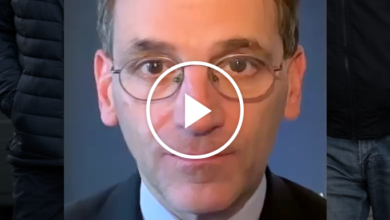The many challenges at Guantanamo Bay, summed up in one case

Many of the questions surrounding the future of prison operations at Guantanamo Bay came together in the conviction of an al Qaeda commander who pleaded guilty to captivity, including the aging population and secret plea deals.
At a hearing last month, the prisoner sat in a padded hospital chair, a four-wheeled walker and a grabber within reach, looking little like the revered insurgent commander he once was in Afghanistan. A crippling spinal disease has left him disabled, and his lawyers say he is in constant pain.
In the jury box across from the prisoner, Abd al-Hadi al-Iraqi, 11 American servicemen looked fit and polished in their service uniforms. The panel sentenced him to the maximum possible sentence, an additional 30 years in prison, without realizing that his fate had already been determined in a secret plea agreement two years earlier.
Mr. Hadi, who was captured in 2006, is now one of four convicted prisoners at Guantanamo Bay. But like most of the 30 detainees there, he has theoretically been cleared for transfer to a stable, trusted U.S. ally. At 63, he is also the oldest prisoner and one of the sickest in the offshore operation’s aging and ailing population.
In 2022, a Pentagon official in charge of the court agreed to reduce his sentence to 10 years, taking into account his plea and cooperation with the U.S. government. In other words, the prisoner could be released in 2032. Under the agreement, he could leave earlier, if a country can be found to take him into custody and provide him with health care.
Eighteen other prisoners who have been held longer than Mr Hadi have also been given permission to be transferred, provided security measures are in place.
Most of the released prisoners cannot be repatriated because the United States considers their home countries too unstable or their governments too hostile to locate and rehabilitate them. This group includes 11 Yemenis, one Somali and one Libyan who have never been charged or convicted.
For Mr Hadi, this means being away from his wife and four adult children, all citizens of Afghanistan, his adopted homeland. U.S. diplomats have discussed his case with other countries. None have agreed to take on the plight of a recognized war criminal who still needs medical care after six spinal surgeries at Guantanamo.
The trial also served as a model for resolving the long-running war crimes cases at Guantanamo Bay through plea agreements.
Under the secretive military commission process, a judge could not simply convict Mr. Hadi. Instead, the Pentagon flew the panel of military officers to Guantanamo from U.S. bases around the world and began a two-week criminal trial, a mini-trial.
The panel was given time to study and provide a detailed 18-page, 124-paragraph document, essentially a sworn confession drawn up with prosecutors. In it, Mr. Hadi told his life story. He explained that he had fled to Afghanistan to avoid rejoining the Iraqi army and serving in the 1991 Gulf War, and that he later became part of Al Qaeda’s inner circle.
He admitted that the insurgents he led unlawfully masqueraded as civilians in attacks that killed 17 American and coalition troops in Afghanistan in 2003 and 2004.
Then it was the victims’ turn. Three veterans of the U.S.-led invasion of Afghanistan and the father and sister of a commando killed in action spoke of their lingering trauma, even now, years after the end of America’s longest war. They described broken homes and broken bodies, feelings of guilt and helplessness.
Master Sgt. Robert Stout, retired, described surviving a failed suicide bombing and then disarming the device — a taxi loaded with explosives, an experience that left him with debilitating stress. Yet he told the prisoner, “We live, you lose.”
Mr. Hadi expressed remorse and asked for mercy.
Within the Black Sites
Two-thirds of the prisoners now at Guantánamo served time in the CIA’s secret interrogation program, according to a largely classified 2014 Senate study of the now-banned program. And Mr. Hadi’s sentencing hearing offered a rare glimpse inside.
Using government-produced 360-degree forensic photography, Mr. Hadi and one of his defense attorneys briefed jurors on the “black site” where Mr. Hadi was held incommunicado in Afghanistan before being transferred to Guantanamo Bay in 2007. They showed a six-square-foot space empty white “silent room” where Mr Hadi was held for about three months – apart from a bloodstain on a wall, a bucket for a toilet and a thin mat on the floor that the prisoner said he had rolled up as a pillow.
Mr Hadi’s legal team managed to get the material released despite objections from Douglas J. Kortthe chief prosecutor, the images of the windowless cell were shown to the public, which in the courtroom that day consisted of the victims, two law students and a reporter.
Growing older and getting sicker
Mr. Hadi’s disability was also visible during the hearing, starting with soldiers wheeling him into the courtroom, where a hospital bed sat in a far corner. The judge held brief morning sessions before Mr. Hadi’s prescribed painkillers made him too drowsy to follow the proceedings.
Defense attorneys in other cases see him as the vanguard of emerging health problems in a population of inmates with traumatic brain injuries, mental illness, gastrointestinal disorders and back and neck injuries. The attorneys blamed the inmates’ health problems on the years they spent in the black sites.
The military judge, Colonel. Charles L. Pritchard Jr., said certain adjustments had been made “to ensure that the right of the accused to attend these legal proceedings is not adversely affected.” He warned the jury not to use this against the prisoner.
Major. Lucas R. HuisengaA Navy lawyer on the defense team said Mr. Hadi received substandard medical care at the “substandard facility” at Guantanamo and as a result “is permanently disabled and in chronic, severe pain.” Any U.S. service member in similar circumstances would have been medically evacuated to better-equipped military medical facilities in the United States.
Congress prohibits the transfer of prisoners into the United States for medical care or other reasons.
When Hadi was found partially paralyzed and incontinent in his cell in September 2017, the Navy sent an inexperienced surgeon to Guantanamo who did not have enough resources to operate on him, Maj. Huisenga said.
The prosecutor, Mr Short, defended Mr Hadi’s care as “certainly not inadequate” and dismissed his diagnosis of untreated post-traumatic stress disorder as likely the result of guilt.




